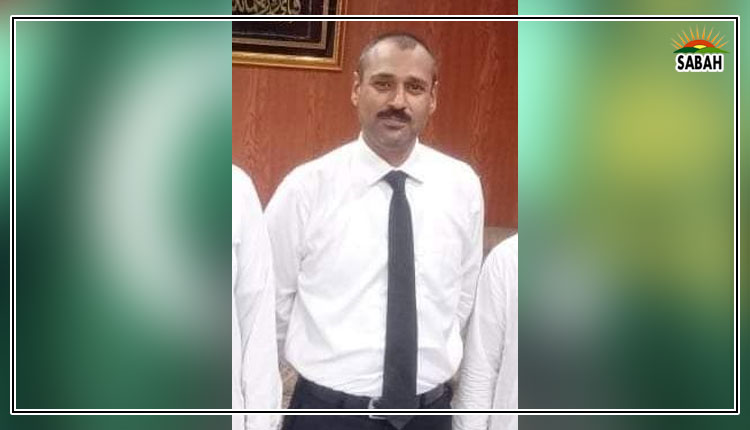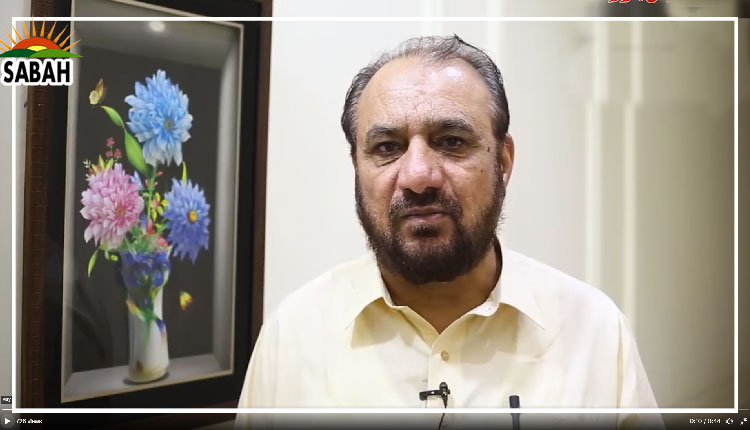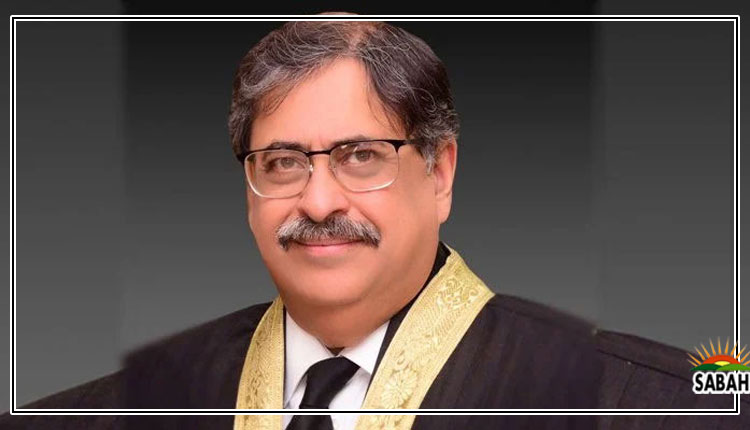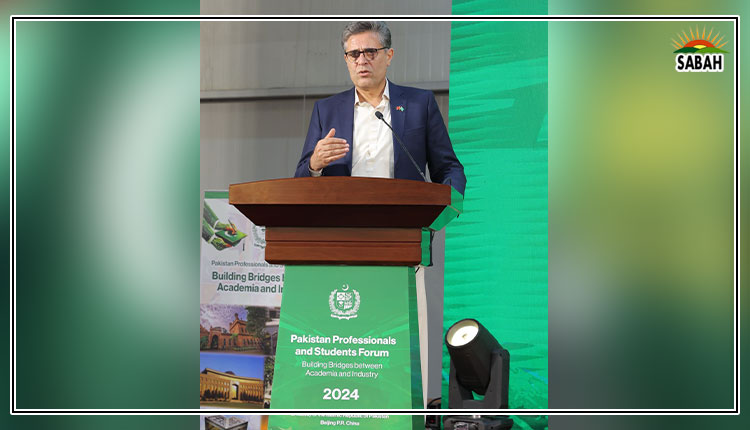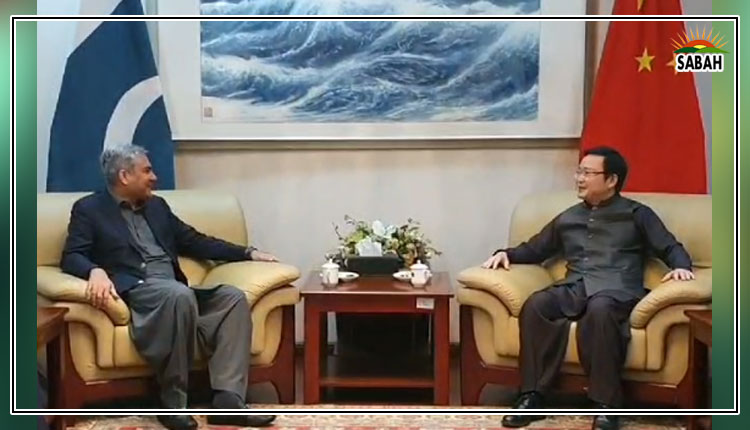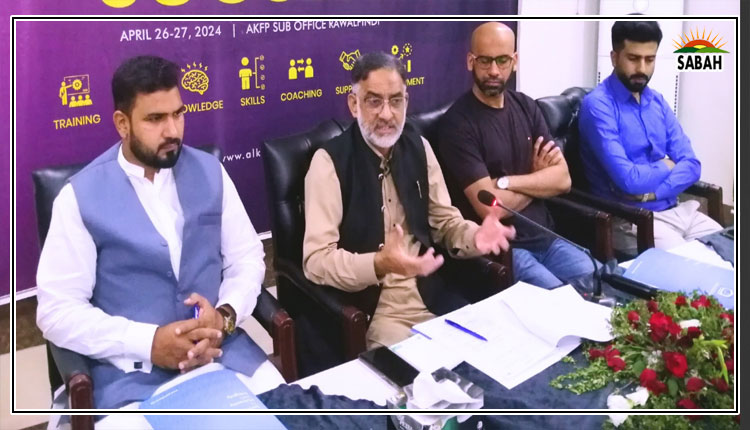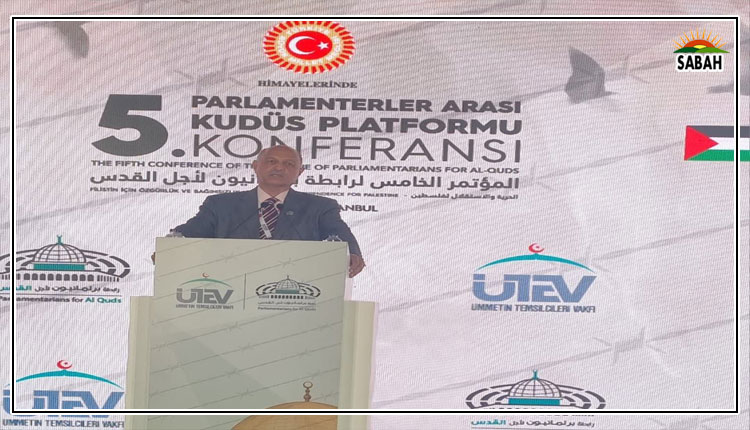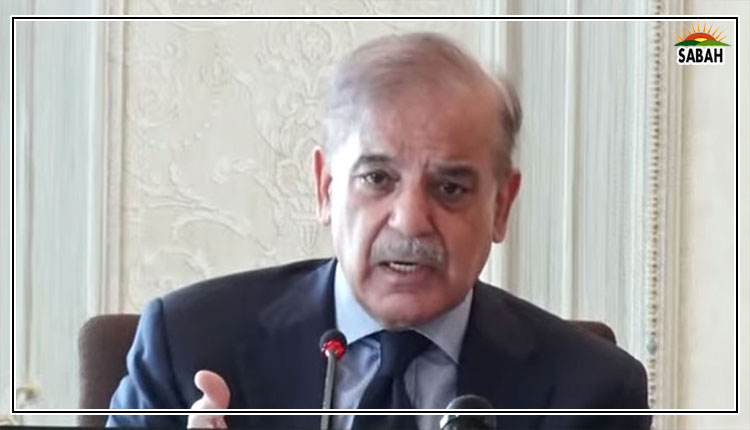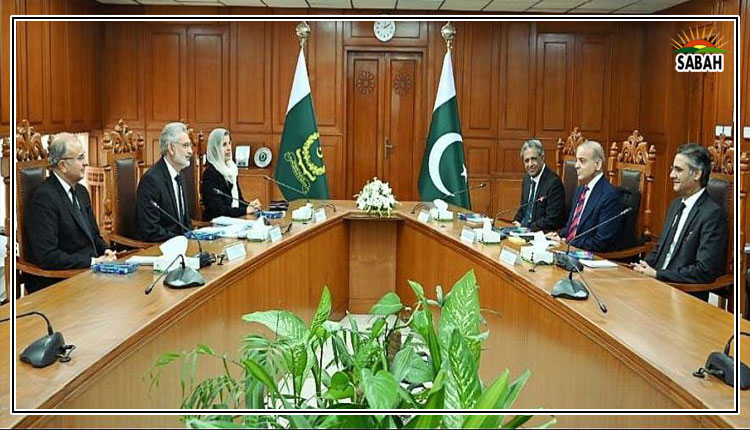PM Shehbaz Sharif holds meeting with CJP Qazi Faez Isa at Supreme Court
ISLAMABAD, March 28 (SABAH): Prime Minister Mian Muhammad Shehbaz Sharif held a meeting with Chief Justice of Pakistan Justice Qazi Faez Isa at the Supreme Court in Islamabad on Thursday.
Senior most Judge of the Supreme Court Justice Syed Mansoor Ali Shah, Law Minister Chaudhry Azam Nazeer Tarar Advocate, Attorney General for Pakistan Barrister Mansoor Usman Awan and Registrar Supreme Court Ms. Jazeela Aslam were also present on the occasion.
Strict security measures were taken at the Supreme Court on the occasion of Prime Minister Shehbaz Sharif’s visit.
Meanwhile Law Minister Azam Nazeer Tarar announced on Thursday that the government would establish an inquiry commission to investigate allegations made by judges of the Islamabad High Court (IHC), accusing the country’s intelligence agencies of interfering in judicial matters.
While addressing a press conference alongside Attorney General Mansoor Usman Awan, the law minister stated that the commission would be formed in accordance with the Pakistan Commissions of Inquiry Act and would be chaired by an impartial retired judge who would compile a report on the commission’s findings.
He mentioned that the name of the individual appointed to lead the commission would be announced within two to four days.
Tarar explained that PM Shehbaz Sharif would present the matter to the cabinet tomorrow (Friday), which would then establish the commission to investigate the allegations made by six IHC judges.
He added that the premier also reassured that it was the government’s duty to ensure an investigation into the matter and that such allegations, if they were true, did not reoccur in the future. “The prime minister point-blank said there will be no compromise on the independence of the judiciary.”
The minister explained that he and the AGP would work on the initial terms of reference for the inquiry commission, adding that they would include a probe for not only the current controversy but also past events as far as the law or cabinet allowed.
He further said that it was inappropriate to mention the names initially under consideration to head the commission since the cabinet had the authority over the matter. Tarar said the body would be notified in two to four days after Friday’s cabinet session.
The law minister said that CJP Isa had also agreed to the formation of an inquiry commission. He explained that there was already a mechanism present to investigate such matters which the federal government carried out and thus it was better for a commission to investigate it instead of a suo motu notice.
On a question about whether the letter amounted to misconduct from the judges, Tarar said the answer to this should come from the commission.
Tarar said the letter from the six IHC judges mentioned events “from the last year [and] with a regime which is no longer in the judicial corridors”, adding that most of the allegations in the letter concerned the “tenure of the former chief justice of Pakistan”.
He said CJP Isa had expressed a wish for the prime minister to have a talk with him on the matter and the latter had readily agreed to prioritise the issue over all others due to the seriousness of the development.
Tarar said the meeting’s participants discussed the matter, as well as other important national affairs such as tax-related issues and fiscal matters.
“There was a discussion on different aspects of the matter [at hand] considering its seriousness and it was also discussed that this has not happened for the first time and such voices have been raised before in history as well,” the minister said, referring to the case of former IHC judge Shaukat Aziz Siddiqui.
The law minister said that PM Shehbaz also reassured that Pakistan was a constitutional organism in which all institutions performed their roles while remaining within their domains.
“The premier reassured the chief justice and his judges that institutional interference should never happen and the government’s obligations in this regard will be fulfilled.”
Tarar said PM Shehbaz also expressed his expectation that the institutions would not transgress their constitutional boundaries and domains.
The law minister said that speaking for himself, it would have been better if the letter had come out in the term of the previous CJP since it concerned events from that timeframe and judicial regime.
Tarar said such matters should be transparently dealt with instead of being swept under the rug.
Meanwhile Chairman Executive Committee of the Pakistan Bar Council (PBC) Farooq Hamid Naek has summoned a meeting of the executive committee on April 5 to discuss the situation after the judges’ letter.
PBC Vice Chairman Riazat Ali Sahar and Farooq Naek on Wednesday had called for a thorough investigation by a proper committee, comprising at least three senior judges of the Supreme Court and constituted by CJP Isa, since the allegations of interference and intimidation were significant.
The statement emphasised the immediate necessity for the council, as the principal representative body of the legal fraternity, to address the concerning issues outlined in a letter directed to the Supreme Judicial Council.
The missive, submitted by high court judges, brings to light allegations of interference, and intimidation on the part of executives and intelligence agencies, said the statement, adding the concerns were indeed “grave and warrant immediate attention”.
However, the correct competent authority to address these concerns is not the SJC but the CJP because the SJC under Article 209 is the forum to address the complaints against the judges of superior courts, the statement said. The statement said the letter depicted a troubling narrative of attempts to undermine the autonomy of the judiciary and influence judicial proceedings for political ends.
Particularly concerning are the incidents recounted, such as the alleged coercion of judges by operatives of intelligence agencies, including instances of surveillance, abduction, and intimidation directed at judges and their families, it added.
These actions, if proven true, represent a direct assault on the rule of law and the principles of justice that form the bedrock of any democratic society, the statement said.
On the other hand, Supreme Court Bar Association (SCBA) President Barrister Muhammad Shahzad Shaukat and Secretary Syed Ali Imran along with the 26th Executive Committee of the association, affirmed their commitment to the independence of the judiciary.
“Such issues should be addressed in a befitting manner and any apprehensions/misgivings which might be in the minds of the judges should be adequately addressed,” Shahzad Shaukat said in reference to the alleged harassment meted out to the judges and their families.
Expressing unwavering support for the judiciary as an institution and for the IHC judges, the statement said that the SCBA would not tolerate any incidents aimed at undermining the independence and functioning of judicial institutions.
Earlier this week, the six judges wrote a startling letter to Supreme Judicial Council (SJC) members, regarding attempts to pressure judges through abduction and torture of their relatives as well as secret surveillance inside their homes.
The letter addressed to SJC members — CJP Isa, Supreme Court Justices Mansoor Ali Shah and Munib Akhtar and IHC CJ Aamer Farooq and Peshawar High Court CJ Mohammad Ibrahim Khan — also questioned if there existed a state policy to “intimidate” and coerce judges.
It was signed by IHC Justices Mohsin Akhtar Kayani, Tariq Mehmood Jahangiri, Babar Sattar, Sardar Ejaz Ishaq Khan, Arbab Muhammad Tahir and Saman Rafat Imtiaz.


